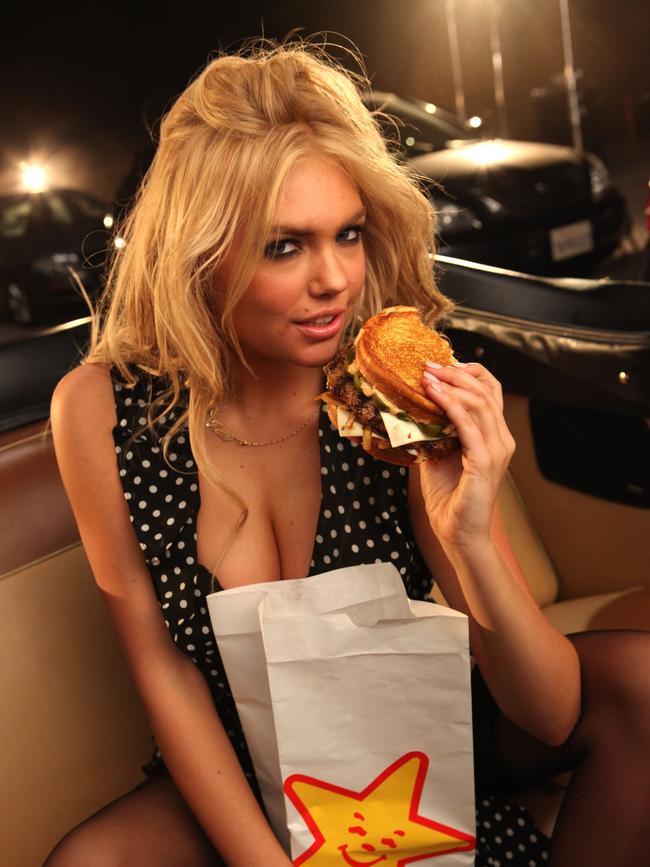US burger chain Carl’s Jr has lurched into administration in Australia
The flamboyant US chain has collapsed in Australia with its stores closed and placed into administration, as the consumer downturn hurts the restaurant and fast-food industry.

Business
Don't miss out on the headlines from Business. Followed categories will be added to My News.
The flamboyant US burger chain Carl’s Jr has placed its Australian stores into voluntary administration after its ambitious dreams to open as many as 300 stores here look to have been snuffed out by the sharp pullback in consumer spending at restaurants and cafes amid the cost of living crisis.
The shock and sudden collapse will affect 49 stores in Australia and many jobs, especially in regional centres.
KPMG late last night announced David Hardy, George Georges and Emily Seeckts had been appointed administrators to Carl’s Jr fast-food stores across Victoria, New South Wales and Queensland with hundreds of jobs now under a cloud.
The Carl’s Jr stores in Australia, collectively known as the CJ’s Group, is a licensee of Carl’s Jr restaurants in Australia and independently owns and operates 24 Carl’s Jr restaurants. The CJ’s Group also serves as the master licensee to 25 Carl’s Jr restaurants independently owned and operated by third party sub-licensees.
The KPMG voluntary administrators have now assumed day-to-day control of CJ’s Group and are undertaking an urgent assessment of the business and its operations, KPMG said in a statement.
“Based on the initial stages of this assessment, the voluntary administrators will continue to trade four of the owned and operated CJ’s Group restaurants on a business-as-usual basis. Twenty restaurants will be immediately closed as of the date of the appointment.”
The appointment of voluntary administrators excludes the 25 restaurants independently owned and operated by third party sub-licensees. These restaurants will be transitioned to a direct licensed relationship with CKE Restaurants Holdings Inc. The voluntary administrators anticipate minimal change in the continued operation of these locations.

The franchisor, Carl’s Jr Restaurants, a subsidiary of CKE Restaurants Holdings Inc, is not in administration and global operations including restaurants owned and operated by licensees other than CJ Group continue to operate business as usual.
“As voluntary administrators, our initial focus will be on stabilising the operations of CJ’s Group. We will be conducting an immediate sale process of the existing store network and operations. We will be working with all stakeholders, including employees, suppliers and landlords, to maximise the outcome for all parties,” said KPMG Australia’s restructuring services partner Mr Hardy.
Carl’s Jr, which operates in more than 30 countries, had big plans when it opened its first store in Australia in 2016 that included opening as many as 300 stores as it took on the might of traditional and dominant burger chains McDonald’s and Hungry Jack’s.
Its first store was in Bateau Bay, on the NSW Central Coast.
It had positioned itself in Australia as a more premium burger store, more expensive than McDonald’s and Hungry Jack’s, but also not as expensive as more pricey outlets such as Grill’d. It was almost famous in the US for its huge burgers, led by the Carl’s Jr Monster Angus Thickburger that delivered a powerful punch of 1290 calories in one burger.
It also built a reputation for its racy and controversial TV ads which included model Heidi Klum licking a burger, mega-influencer Kim Kardashian submerged in a bubble bath as well as suggestively eating Carl’s Jr food and another one-time social media star Paris Hilton sporting a revealing swimsuit, eating a burger and washing a Bentley.
The fast-food and restaurant sector is currently in the grips of a major downturn as consumers look to save money in the face of cost of living pressures and dine more at home rather than pick up a takeaway.
The Australian reported that hospitality businesses have failed at the fastest rate on record in the 2024 financial year as soaring food and energy prices and a pullback in consumer spending pushed cafes and restaurants to the wall.
Cafes, restaurants and small retailers registered disproportionate growth in insolvency appointments in the past year, while consumers have been forced to pay more for essential items and pulled back from discretionary purchases.
New data from the Australian Securities & Investments Commission shows accommodation and food services insolvency appointments rose faster than any other sector in the 12 months to June 30. The number of collapses skyrocketed by 50 per cent to a record 1667, compared to its previous high of 1114 in 2023.
It comes as Mexican-themed fast-food chain Guzman y Gomez recently listed on the ASX with analysts and investors divided over the huge values placed on that fast-food business and the trading pressures now facing the quick service food industry.
More Coverage
Originally published as US burger chain Carl’s Jr has lurched into administration in Australia





